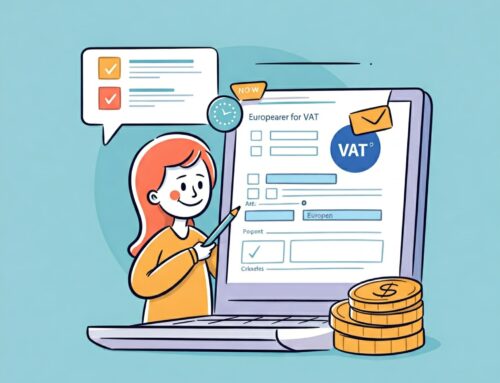This article has been written after the the substantial change in VAT regulation of July 2021.
If you are not based in EU and want to sell to european people or business the first you need is a tax o vat id number in any of the EU countries
Frequently asked questions for VAT from people not based in EU:
- Do I need to register for VAT in the EU if I am a non-EU company selling goods or services to customers in the EU? Yes, if you sell to EU customers, you will need to register for VAT in the EU even if you sell only digital services or goods. The only exception is if you only sell to registered companies in EU and you exclude the vat tax from your prices prior validation of their VAT number. The EU administration provides an online validation tool for VAT numbers and you can use it also from some plugins or ecommerce tools.
- What is the VAT rate for my goods or services in the EU? VAT rates vary by country, and there are different rates for different types of goods and services. The EU provides a database with all this information and we extract it in an excel sheet or csv file that can be imported in many online systems to apply VAT rates per country properly.
- How do I register for VAT in the EU? You can register for VAT in each EU country where you have sales, or you can use the One Stop Shop (OSS) system to register in one EU country and report your sales to all other EU countries. Depending on the type of products and sales or where you store your goods the OSS may not work for you.
- Do I need a fiscal representative to register for VAT in the EU? It depends on the country. Some countries require non-EU businesses to appoint a fiscal representative, while others do not. You should check the specific requirements of each country where you plan to do business. It also depends on the type of register you use: OSS vs IOSS.
- What is VIES? VIES (VAT Information Exchange System) is a search tool of the European Commission. The data is retrieved from national VAT databases when a search is made from the VIES tool. The search result that is displayed within the VIES tool can be in one of two ways; EU VAT information exists (valid) or it doesn’t exist (invalid).
- What is the format of a vat id number ? The format of a VAT ID number can vary depending on the country. However, in general, it consists of a two-letter country code followed by a string of numbers and, in some cases, letters. For example, a VAT ID number in Germany has the format DE123456789, where DE is the country code and 123456789 is the unique identifier assigned to the registered company or individual. It’s important to note that the specific format can vary by country and may have additional or different requirements.
- What are the penalties for non-compliance with VAT regulations in the EU? The penalties for non-compliance with VAT regulations in the EU vary by country, but they can go from paying the VAT rate that should have been charged to client, around 20% of the money received from EU clients from the last 5 years with interest charges, to criminal prosecution in some cases.





